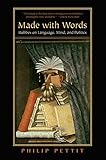Made with Words : Hobbes on Language, Mind, and Politics / Philip Pettit.
Material type: TextPublisher: Princeton, NJ : Princeton University Press, [2009]Copyright date: ©2009Edition: Core TextbookDescription: 1 online resource : 1 line illusContent type:
TextPublisher: Princeton, NJ : Princeton University Press, [2009]Copyright date: ©2009Edition: Core TextbookDescription: 1 online resource : 1 line illusContent type: - 9780691143255
- 9781400828227
- B1247.P48 2008
- online - DeGruyter
- Issued also in print.
| Item type | Current library | Call number | URL | Status | Notes | Barcode | |
|---|---|---|---|---|---|---|---|
 eBook
eBook
|
Biblioteca "Angelicum" Pont. Univ. S.Tommaso d'Aquino Nuvola online | online - DeGruyter (Browse shelf(Opens below)) | Online access | Not for loan (Accesso limitato) | Accesso per gli utenti autorizzati / Access for authorized users | (dgr)9781400828227 |
Browsing Biblioteca "Angelicum" Pont. Univ. S.Tommaso d'Aquino shelves, Shelving location: Nuvola online Close shelf browser (Hides shelf browser)

|

|

|

|

|

|

|
||
| online - DeGruyter Demons, Dreamers, and Madmen : The Defense of Reason in Descartes's Meditations / | online - DeGruyter Political Hypocrisy : The Mask of Power, from Hobbes to Orwell and Beyond / | online - DeGruyter Troublemaker : A Personal History of School Reform since Sputnik / | online - DeGruyter Made with Words : Hobbes on Language, Mind, and Politics / | online - DeGruyter Religion and the Constitution, Volume 2 : Establishment and Fairness / | online - DeGruyter Shakespeare / | online - DeGruyter Shifting Involvements : Private Interest and Public Action - Twentieth-Anniversary Edition / |
Frontmatter -- Contents -- Introduction -- CHAPTER ONE. Mind in Nature -- CHAPTER TWO. Minds with Words -- CHAPTER THREE. Using Words to Ratiocinate -- CHAPTER FOUR. Using Words to Personate -- CHAPTER FIVE. Using Words to Incorporate -- CHAPTER SIX. Words and the Warping of Appetite -- CHAPTER SEVEN. The State of Second, Worded Nature -- CHAPTER EIGHT. The Commonwealth of Ordered Words -- Summary -- Notes -- References -- Index
restricted access online access with authorization star
http://purl.org/coar/access_right/c_16ec
Hobbes's extreme political views have commanded so much attention that they have eclipsed his work on language and mind, and on reasoning, personhood, and group formation. But this work is of immense interest in itself, as Philip Pettit shows in Made with Words, and it critically shapes Hobbes's political philosophy. Pettit argues that it was Hobbes, not later thinkers like Rousseau, who invented the invention of language thesis--the idea that language is a cultural innovation that transformed the human mind. The invention, in Hobbes's story, is a double-edged sword. It enables human beings to reason, commit themselves as persons, and incorporate in groups. But it also allows them to agonize about the future and about their standing relative to one another; it takes them out of the Eden of animal silence and into a life of inescapable conflict--the state of nature. Still, if language leads into this wasteland, according to Hobbes, it can also lead out. It can enable people to establish a commonwealth where the words of law and morality have a common, enforceable sense, and where people can invoke the sanctions of an absolute sovereign to give their words to one another in credible commitment and contract. Written by one of today's leading philosophers, Made with Words is both an original reinterpretation and a clear and lively introduction to Hobbes's thought.
Issued also in print.
Mode of access: Internet via World Wide Web.
In English.
Description based on online resource; title from PDF title page (publisher's Web site, viewed 08. Jul 2019)


